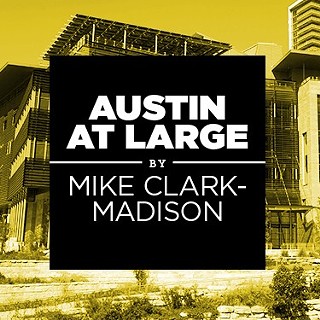Austin at Large: The City That Never Shrinks
“Austin’s rapid growth” has become background noise. We should bring it up front.
By Mike Clark-Madison, Fri., May 14, 2021
Our "Best of Austin" issue, like so many happenings and events that used to be on fixed and predictable cycles, has emerged from COVID-induced hibernation, but in the spring and not the fall. Things are back to normal, but a little different, all over. Last week, Austin voters turned back the city's homelessness clock to the spring of 2019. This week, the Legislature made more moves to turn back Austin's cop clock to the Before Times, when police funding grew inexorably, mindlessly, as a function of our population growth.
The prospect that Future Austin may cease to grow without ceasing, and may need to stop overfunding its police force, seems as unlikely to political decision-makers as, well, the chance that Texans would freeze to death because the power grid failed. Our most recent data points give them little reason to think otherwise.
Austin remains the nation's fastest-growing large metro area by a wide margin (a 30% increase since 2010; Raleigh is second at 23%). It is growing much faster than Houston, Dallas/Ft. Worth, or San Antonio, all of which are also outpacing most of the U.S. As for the city proper, current estimates place us above 1 million, adding about 20,000 residents annually, which is like annexing Manor each and every year. (Manor itself has grown at 10 times that rate.) Demographers in San Jose raised eyebrows there recently by demoting themselves out of and raising us up into America's Top 10 largest cities, though not all forecasters agree yet. It's close! (Austin's grown about twice as fast as San Jose since 2010.)
The actual 2020 census data, when we finally get it this fall, will probably not be as accurate as we'd like thanks to state apathy and federal depravity, but should not challenge this storyline too much. In any event, it's already significantly out of date. Many of us have stopped paying much attention to Austin's growth because it literally has always been this way for more than half the people in town. But it matters. We are growing like nobody else. We keep growing no matter what. We have no "peer cities." Our "normal" is always a "new normal." Everything is always a little different.
And We Should Act Like It
We can, and do, anatomize that growth in different ways to prove our desired political points. Elon Musk, the techies who work for him now, the factory workers who will labor in his Southeast Austin Gigafactory in a couple of years, and the construction workers who will erect that factory in the interim are all very different people, but they all are faces of Austin's endless boom. As I type these words, a news alert crosses my screen from the Austin Business Journal talking about 23 different corporate HQ relocations they've covered so far this year, which is only one-third over. Earlier this week, I got a press release from an outfit that tracks foreign direct investment in American real estate. Austin is the No. 1 market for such investors – the first time in their 20-plus years of rankings that a "tertiary" market leads the table, or has even been in the Top 10.
As easy as it is to rattle off such facts and stats, it is extraordinarily difficult to get people to absorb them in ways that change their established frames for thinking about Austin – what it is, what it was, what it should be. To a degree, that's no surprise; status quo biases are common, conservative resistance to change is constant, preservationist instincts are really popular. People who eagerly embrace the future are weird, but not the kind of Weird that Austin has made its brand. Those political tendencies, dynamics rooted in emotion and human nature, will always exist.
And it will likewise always be true that a big chunk of Austinites who have access to political influence view the specific changes brought by our ongoing growth as being negative for them, that they are paying a unique price as Austin becomes more crowded and expensive and traffic-choked and gentrified, since they were happy with what it once was. That creates a reservoir of grievance that gets sprayed out at every opportunity for civic engagement, which is exhausting even if it's healthier than a culture of apathy and disempowerment.
But it would be healthier still if people understood better what the status quo really is. Sizeable numbers of unhoused poor? That's Austin, and as long as the cheapest apartment in town (or even in the suburbs) is beyond the reach of many who have jobs, because we're growing like nobody else, it's not going to change, no matter how Prop B backers want to define "normal." It took them extraordinary effort – a special election, a huge money bomb, help from the governor himself – to turn the clock back just a little bit.
It will take even more heavy lifting, and probably some violence to the state and federal constitutions, to turn back the policing clock. Regardless of how much money Austin is forced to spend, the city's relationship with its cops is forever changed, because we're growing like nobody else, and are now much more flush with people who do not love the police. Soon, we'll need to finally make some long-deferred decisions about land use. Because we're growing like nobody else, how do you think that'll go?
Got something to say? The Chronicle welcomes opinion pieces on any topic from the community. Submit yours now at austinchronicle.com/opinion.







